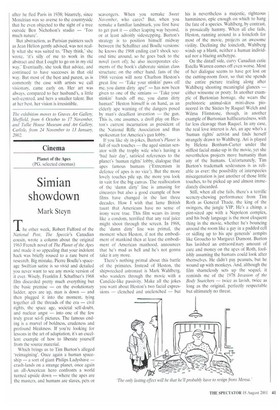Simian showdown
Mark Steyn
The other week, Robert Fu!ford of the National Post, The Speccie's Canadian cousin, wrote a column about the original 1963 French novel of The Planet of the Apes and made it so appealing that your indolent hack was briefly roused to a rare burst of research. Big mistake. Pierre Boulle's spaceage Swiftian satire is so vivid and detailed you never want to see any movie version of it ever. Wisely. Franklin J. Schaffner's 1968 film discarded pretty much everything but the basic premise — on the evolutionary ladder, apes are up, man is down — and then plugged it into the moment, tying together all the threads of the era — civil rights, the space age, societal self-doubt, and nuclear angst — into one of the few truly great sci-fi pictures. The famous ending is a marvel of boldness, crudeness and profound bleakness. If you're looking for lessons in the art of adaptation, it's an excellent example of how to liberate yourself from the source material.
Which brings us to Tim Burton's alleged `reimagining'. Once again a human spaceship — a sort of giant Philips Ladyshave — crash-lands on a strange planet, once again an all-American hero confronts a world turned upside down — where the apes are the masters, and humans are slaves, pets or scavengers. When you remake Sweet November, who cares? But, when you remake a familiar landmark, you first have to get past it — either leaping way beyond, or at least adroitly sidestepping. Burton's strategy is to position himself midway between the Schaffner and Boulle versions: he knows the 1968 ending can't shock second time around, so he goes back to the novel (sort of); he also incorporates elements of the book's elaborate simian class structure; on the other hand, fans of the 1968 version will note Charlton Heston's great line — 'Take your stinkin' paws off me, you damn dirty ape!' — has now been given to one of the simians — 'Take your stinkin' hands off me, you damn dirty human!' Heston himself is on hand, as an elderly ape warning of the dangers posed by man's deadliest invention — the gun. This is, one assumes, a droll play on Heston's current incarnation as president of the National Rifle Association and thus spokesman for America's gun lobby.
If you like sly in-jokes, Burton's Planet is full of such touches — the aged simian senator with the trophy wife who's having a 'bad hair day', satirical references to the planet's 'human rights' lobby, dialogue that apes famous humans ('Extremism in defence of apes is no vice'). But the more lovely touches pile up, the more you look in vain for the big canvas. The reallocation of the 'damn dirty' line is amusing for cineastes but also a good example of how films have changed in the last three decades. How I wish that lame British taunt that Americans have no sense of irony were true. This film wears its irony like a condom, terrified that any real juice might shoot through the screen. In 1968, the 'damn dirty' line was primal, the moment when Heston, if not the embodiment of mankind then at least the embodiment of American manhood, announces that he's mad as hell and he's not gonna take it any more.
There's nothing primal about this battle of the primates. Instead of Heston, the shipwrecked astronaut is Mark Wahlberg, who wanders through the movie with a Candide-like passivity. Make all the jokes you want about Heston's two facial expressions — clenched and unclenched — but his is nevertheless a majestic, righteous hamminess, epic enough on which to hang the fate of a species. Wahlberg, by contrast, is prosaically hammy. When all else fails, Heston, running around in a loincloth for most of the movie, projects an awesome virility. Declining the loincloth, Wahlberg winds up a blank, neither a human individual nor a blazing archetype.
On the distaff side, curvy Canadian cutie Estella Warren comes off even worse. Most of her dialogue seems to have got lost on the cutting-room floor, so that she spends the entire picture trailing along after Wahlberg shooting meaningful glances — either winsome or pouty. In another example of Burtonian homage, she wears the prehistoric animal-skin mini-dress pioneered in the Sixties by Raquel Welch and Wilma Flintstone, though, in another example of Burtonian halfheartedness, with far less cleavage than Raquel. In any case, the real love interest is An, an ape who's a 'human rights' activist and finds herself strangely drawn to Wahlberg. An is played by Helena Bonham-Carter under the stiffest facial make-up in the movie, yet she nevertheless projects more humanity than any of the humans. Unfortunately, Tim Burton's trademark sexlessness is as reliable as ever: the possibility of interspecies miscegenation is just another of those little touches, to be picked up and almost immediately discarded.
Still, when all else fails, there's a terrific scenery-chewing performance from Tim Roth as General Thade, the king of the swingers, the jungle VIP. He's a chimp, a pint-sized ape with a Napoleon complex, and his body language is the most eloquent thing in the movie, whether he's bouncing around the room like a guy in a padded cell or sidling up to his ape generals' armpits like Groucho to Margaret Dumont. Burton has lavished an extraordinary amount of care and money on the apes of Roth, foolishly assuming the humans could look after themselves. He didn't pa} peanuts, but he wound up with monkeys. And, although the film shamelessly sets up the sequel, it reminds me of the 1978 Invasion of the Body Snatchers — twice as lavish, twice as long as the original, perfectly respectable but ultimately no threat.


























































 Previous page
Previous page